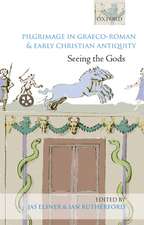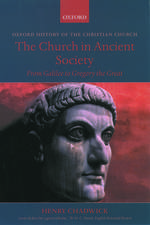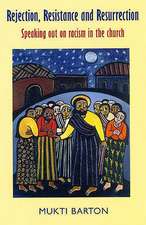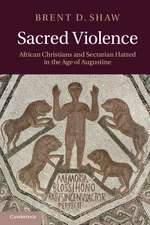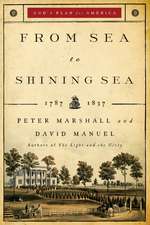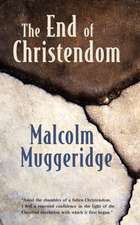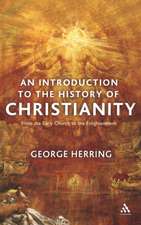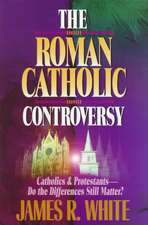Christianity and the University Experience: Understanding Student Faith
Autor Dr Mathew Guest, Dr Kristin Aune, Dr Sonya Sharma, Dr Rob Warneren Limba Engleză Paperback – 11 sep 2013
| Toate formatele și edițiile | Preț | Express |
|---|---|---|
| Paperback (1) | 218.47 lei 6-8 săpt. | |
| Bloomsbury Publishing – 11 sep 2013 | 218.47 lei 6-8 săpt. | |
| Hardback (1) | 772.58 lei 6-8 săpt. | |
| Bloomsbury Publishing – 11 sep 2013 | 772.58 lei 6-8 săpt. |
Preț: 218.47 lei
Preț vechi: 245.18 lei
-11% Nou
Puncte Express: 328
Preț estimativ în valută:
41.81€ • 43.49$ • 34.52£
41.81€ • 43.49$ • 34.52£
Carte tipărită la comandă
Livrare economică 14-28 aprilie
Preluare comenzi: 021 569.72.76
Specificații
ISBN-13: 9781780937847
ISBN-10: 1780937849
Pagini: 256
Ilustrații: illustrations
Dimensiuni: 156 x 234 x 8 mm
Greutate: 0.39 kg
Editura: Bloomsbury Publishing
Colecția Bloomsbury Academic
Locul publicării:London, United Kingdom
ISBN-10: 1780937849
Pagini: 256
Ilustrații: illustrations
Dimensiuni: 156 x 234 x 8 mm
Greutate: 0.39 kg
Editura: Bloomsbury Publishing
Colecția Bloomsbury Academic
Locul publicării:London, United Kingdom
Caracteristici
Contextualizes UK research within global perspectives, drawing on American and European theories.
Notă biografică
Mathew Guest is Senior Lecturer in Theology and Religion at Durham University, UK.Kristin Aune is Senior Lecturer in Sociology at the University of Derby, UK.Sonya Sharma is Research Associate in Theology and Religion at Durham University, UK.Rob Warner is Professor of Religion, Culture and Society, and Dean of Humanities at the University of Chester, UK.
Cuprins
Acknowledgements Foreword - Christian SmithList of Illustrations Introduction 1. Historical, Cultural and Scholarly Contexts 2. What makes a Christian student? 3. Institutional Variations in the University Experience 4. Is the University a Force for Secularisation? 5. The Challenges of being a Christian Student 6. Organised Christianity on the University Campus 7. Social Differences Amongst Christian Students: Age, Class, Ethnicity and Gender 8. Broader Implications Appendix: How many Christian students are there in England's universities? Bibliography Index
Recenzii
This study of the religious experience of Christian students at universities in England is both surprising and most welcome. Surprising, because after almost 60 years of propaganda about the decline of religious faith, one does not expect to find a wide-ranging investigation as specific as this one...most welcome because empirical information carefully gleaned can only promote understanding in the ideological battleground between the die-hard secularists who seem to dominate the academy and the believers (by virtue of their faith deemed ipso facto biased) who appear reactionary and overly defensive... While the authors seek simply to present a snapshot, they do promise to build up to a longitudinal study, which can only add value to our thinking about this important cultural issue. I look forward to the next piece in this jigsaw.
Christianity and the University Experience has set the benchmark for research into religion and higher education. It builds on existing research provided by William Dutton, Paul Weller et al., Adam Dinham and Stephen Jones, andSophie Gilliat-Ray and provides the most ambitious study to date. The range of research methods used in this project helps to tease out the broader context of the Christian student experience, while also being sensitive to thecontradictions, complexities, and nuances that emerge from the personal accounts of students.
The authors take a rigorously social-scientific approach, using questionnaires and interviews, to assess how students' Christian identity both shapes and is shaped by their university experience. Each term in this relation is carefully explored. [...] The book is fascinating and rewarding, and anyone interested in our universities and the future of English Christianity needs to read it.
A book of breadth and therefore essential reading for all who wish to grapple with religious student life; it is also a book of depth and asks awkward questions; it is also a book of thoroughness in both the research and its evaluation. Not to be missed for those engaged in "understanding student faith" - the book's sub-title.
The book offers a timely and provocative contribution to the wider debate today about religion/faith and young people and about religion in the modern world. This means the book will interest people beyond the university and academic field . . . A lot of evidence here to think about and challenge us for the future.
This handsome book is one of the early fruits of the UK's "Religion and Society" programme of research. Its analysis of more than 4,000 responses to a national survey and close to 100 interviews with a variety of informants in a sample of English universities is a model of methodological rigour. More importantly, its findings call in question many popular assumptions both about students and about their highly varied practice of the Christian faith. No doubt, English universities are breeding grounds for indifference to religion but they can also foster some hidden as well as open expressions of Christianity. Now I'm eager for someone to conduct a companion study of students' involvement in religions other than Christianity.
[Christianity and the University Experience] is the first project of this scale to thoroughly investigate the ways in which Christianity is experienced and lived by university students, and its conclusions are enlightening and provocative in equal measure. Big assumptions which many of us make instinctively about this subject are rigorously tested against empirical data. Many of them will need to be seriously rethought in the wake of this book. I would strongly recommend the book for anyone with an interest in the modern university or modern Christianity, or indeed anyone who wishes to be involved with the conversation on these topics.
Christianity and the University Experience offers some useful data, some interesting descriptions, and some thought-provoking remarks from interviewees.
Drawing on original research, this book recalls us to a society - and its universities - which is not only full of religious beliefs, rituals, practices and identities, despite the assumptions of secularism, but full of lived Christianity in particular, which often goes unheard. It is a timely rejoinder to the idea of religion as 'minority' and 'problem' and, through its examination of the students who will be tomorrow's leaders, professionals and thinkers, sets religious identity firmly in the context of society at large.
Is the notion of a 'Christian student' an oxymoron? Anyone tempted to answer 'yes' should read this impeccably researched book, which informs and intrigues in equal measure. It is clear that Christian students not only exist but come in many shapes and sizes - as indeed do universities.
A remarkable study of university students' negotiation of Christian identity, religious organizations, and university life. Highly recommended.
Christianity and the University Experience has set the benchmark for research into religion and higher education. It builds on existing research provided by William Dutton, Paul Weller et al., Adam Dinham and Stephen Jones, andSophie Gilliat-Ray and provides the most ambitious study to date. The range of research methods used in this project helps to tease out the broader context of the Christian student experience, while also being sensitive to thecontradictions, complexities, and nuances that emerge from the personal accounts of students.
The authors take a rigorously social-scientific approach, using questionnaires and interviews, to assess how students' Christian identity both shapes and is shaped by their university experience. Each term in this relation is carefully explored. [...] The book is fascinating and rewarding, and anyone interested in our universities and the future of English Christianity needs to read it.
A book of breadth and therefore essential reading for all who wish to grapple with religious student life; it is also a book of depth and asks awkward questions; it is also a book of thoroughness in both the research and its evaluation. Not to be missed for those engaged in "understanding student faith" - the book's sub-title.
The book offers a timely and provocative contribution to the wider debate today about religion/faith and young people and about religion in the modern world. This means the book will interest people beyond the university and academic field . . . A lot of evidence here to think about and challenge us for the future.
This handsome book is one of the early fruits of the UK's "Religion and Society" programme of research. Its analysis of more than 4,000 responses to a national survey and close to 100 interviews with a variety of informants in a sample of English universities is a model of methodological rigour. More importantly, its findings call in question many popular assumptions both about students and about their highly varied practice of the Christian faith. No doubt, English universities are breeding grounds for indifference to religion but they can also foster some hidden as well as open expressions of Christianity. Now I'm eager for someone to conduct a companion study of students' involvement in religions other than Christianity.
[Christianity and the University Experience] is the first project of this scale to thoroughly investigate the ways in which Christianity is experienced and lived by university students, and its conclusions are enlightening and provocative in equal measure. Big assumptions which many of us make instinctively about this subject are rigorously tested against empirical data. Many of them will need to be seriously rethought in the wake of this book. I would strongly recommend the book for anyone with an interest in the modern university or modern Christianity, or indeed anyone who wishes to be involved with the conversation on these topics.
Christianity and the University Experience offers some useful data, some interesting descriptions, and some thought-provoking remarks from interviewees.
Drawing on original research, this book recalls us to a society - and its universities - which is not only full of religious beliefs, rituals, practices and identities, despite the assumptions of secularism, but full of lived Christianity in particular, which often goes unheard. It is a timely rejoinder to the idea of religion as 'minority' and 'problem' and, through its examination of the students who will be tomorrow's leaders, professionals and thinkers, sets religious identity firmly in the context of society at large.
Is the notion of a 'Christian student' an oxymoron? Anyone tempted to answer 'yes' should read this impeccably researched book, which informs and intrigues in equal measure. It is clear that Christian students not only exist but come in many shapes and sizes - as indeed do universities.
A remarkable study of university students' negotiation of Christian identity, religious organizations, and university life. Highly recommended.



